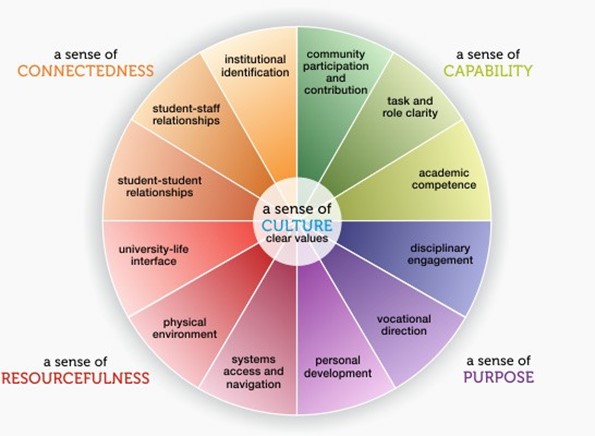
By Sue Robbins, Senior Lecturer SCLS, Director of CPD

Evidence from educational psychology tells us that talking about our learning helps us process it (Resnick, et al. 2017). I run a daily drop-in service to support Academic Development (a core module of the Central Foundation Years) that draws on dialogic theory, an approach and a professional outlook which suggests that ‘we learn not so much by replacing wrong ideas with right ideas, but more often by augmenting existing perspectives with new perspectives which enable us to see further or better or just differently’ (Wegerif 2016). The ‘Thinking Together’ pedagogy developed by Alexander, Mercer & Dawes in the early 1990s harnesses the power of talk to stimulate and extend thinking and advance learning and understanding. It ‘requires us to rethink not just the techniques we use but also the classroom relationships we foster, the balance of power between teacher and taught and the way we conceive of knowledge’ (Alexander, 2010).
Students on the Academic Development module are engaged in a small research project that culminates in a discursive essay. Many attend the drop-in sessions because of ‘the struggle involved in writing at the intellectual and emotional levels, as well as the struggle for recognition, “voice” and legitimacy.’ (Burke, 2008). Aware that teachers’ voices tend to have authority within dialogic spaces I used Lizzio’s 5 Senses of Success framework (2006) to develop a methodology for the drop-in sessions that would allow me to use that authority to open up possibilities for learners to speak.
Lizzio’s framework grew out of research which found there are consistent needs and concerns that students experience as they commence university, outlined in the graphic.

The daily drop-in sessions form part of a proactive approach to supporting students based on an expanded notion of good teaching beyond classroom pedagogy that links teaching and learning to student support as well as fostering social inclusion. The sessions run throughout the year and can be attended on a voluntary basis as often as a student elects. They are not conceived of as remedial, or targeted at students with a Widening Participation background, but are positioned as a service for all students – what Kift et al. (2009) call an ‘everybody’s business’ approach to transition pedagogy. The underlying assumptions are that ‘learning in higher education is a complex social and cognitive process of discovering and mastering… the knowledge-making rules and practices, values and roles that characterise the disciplinary cultures of the various fields of study’ (Warren 2002), and that all students benefit from 1:1 conversations about the process of adaptation required as they transition into HE.
Students who drop in are invited to talk about where they are in the research/writing process and how they are experiencing it and we discuss how they might proceed. We stay rooted in their experiences and explore what may be at stake for them in this specific context (Lillis & Scott 2007). No registers are kept so that no student feels that asking for help will in some way count against them. This video introduction (on the students’ Canvas site) summarises the approach.
The familiar problem of students who would likely benefit from support often not accessing it has been addressed to an extent by the broad range of Central Foundation Years stakeholders who regularly incorporate mention of the service into their own conversations with students – the Academic Development tutors refer students, as do Academic Advisers, the Academic Success Advisers, the DTL and DoSE and the Professional Services team. Students often turn up following a progress committee meeting and in conversation we are often able to identify barriers to progress and discuss ways to overcome them.
Working in this way allows for a different approach to feedback that focusses on what students do, and how they process and act on feedback, rather than what we do. The impact of the drop-in sessions is routinely mentioned positively in Module Evaluation Questionnaires and by the student reps, and students have nominated them for a teaching award in each of the last 3 years. They continued to be well attended through the emergency pivot online (Wegerif on why dialogic teaching is still relevant in the digital age). The following comments demonstrate the way students experience dialogue and their ability to absorb and learn from feedback:
Sue gave me detailed feedback on what I wanted from her, and we were able to have an actual conversation about it which really helped me as I think it allowed me to open up more about the problems I was having.
Sue gave me the start I needed to think for myself in terms of the [essay] question. She asked me the right questions that lead me onto the right path.
I honestly was considering dropping in just to talk because she makes you think and she’s really nice. It was probably the only time I felt like I was actually in uni/like I actually met a tutor.
You can see more responses here from the 2020/2021 cohort (though only 13 respondents… it is very difficult to persuade students to give feedback). Do get in touch or leave a comment below if you’d like to discuss.
Using the UK Professional Standards Framework (UKPSF) to ensure good practice and excellent student experience. The teaching practice outlined in this blog post is informed by the areas in italics:
Areas of activity
- A1 Design and plan learning activities and/or programmes of study
- A2 Teach and/or support learning
- A3 Assess and give feedback to learners
- A4 Develop effective learning environments and approaches to student support and guidance
- A5 Engage in continuing professional development in subjects/disciplines and their pedagogy, incorporating research, scholarship and the evaluation of professional practices
Core knowledge
- K1 The subject material
- K2 Appropriate methods for teaching, learning and assessing in the subject area and at the level of the academic programme
- K3 How students learn, both generally and within their subject/ disciplinary area(s)
- K4 The use and value of appropriate learning technologies
- K5 Methods for evaluating the effectiveness of teaching
- K6 The implications of quality assurance and quality enhancement for academic and professional practice with a particular focus on teaching
Professional values
- V1 Respect individual learners and diverse learning communities
- V2 Promote participation in higher education and equality of opportunity for learners
- V3 Use evidence-informed approaches and the outcomes from research, scholarship and continuing professional development
- V4 Acknowledge the wider context in which higher education operates recognising the implications for professional practice


Leave a Reply